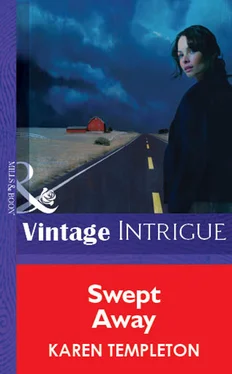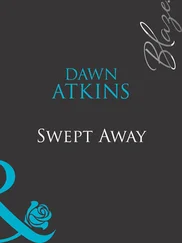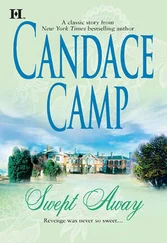“Guess we’re both at a sort of crossroads, aren’t we?”
Since that sounded a heck of a lot better than dead end, she said, “Yeah. Guess so.”
Her father took another swallow of his water. “You got any idea yet what you’re going to do when we go back?”
A logical question from a man who’d—logically—expect his thirtysomething daughter to, you know, have a plan? Since she no longer had a job? Never mind that it now struck her, like the proverbial bolt of lightning, that she’d apparently suggested this trip in order to avoid thinking about The Future. And now here The Future was, planted in front of her like a used car salesman, refusing to go away until she at least sounded as though she’d made a decision.
But she’d gotten real good at faking out her dad over the years. Goading him was one thing. Worrying him was something else, she thought as a surprisingly cool breeze sent a shiver over her skin. Dad had no idea how much about her life she’d chosen not to let him find out. A situation she had no intention of changing.
“I thought I’d see about teaching at the company school.” Actually she hadn’t, not yet, but it sounded good. “And you know Emily offered me a job.”
“That’s in Chicago, right?”
“Right outside. Lake Charles.”
“Gets damn cold up there.”
“Oh, and like Cincinnati’s so tropical?”
“I’m just saying.”
Saying what was the question. But, as she was so good at doing, she turned the tables on him. “What about you? Planning on going out for canasta champion at the Senior Citizen center?”
Lane blew out a half laugh, then shifted to lean against the tree trunk. It seemed strange, seeing her father so relaxed. Not bad, just strange. “Actually bumping along on all these back roads the past month must’ve jostled something loose in my brain, because I’m thinking of starting up some sort of consulting business. Something I could do from home, mostly, by computer.”
Well, hell—this was the first positive thing to come out of her dad’s mouth since Mom’s death. “Seriously?”
“Yep.”
“That’s a terrific idea, Dad.”
“Seriously?”
“Seriously.”
His gaze sidled to hers. “You could help me, you know.”
“Oh, right. Doing what, for God’s sake?”
“Haven’t figured that part out. But I’m sure we could think of something.”
“Dad. What on earth do I know about business?”
“You’re a smart cookie. You’d catch on.”
“Man, you weren’t kidding when you said you knocked something loose.”
“I’ve always thought you were smart, Lee. It was just your common sense I had issues with.”
“A subject I gather you brought up to Sam,” she said before she even knew the words were in nodding distance of her brain.
Dad skimmed a palm over his short hair, looking everywhere but at her. “Your name might’ve come up once or twice.”
“By whom?”
“I don’t remember, actually. What difference does it make?”
“None, I suppose. Except I’m not sure I appreciate being described as a ‘handful’ to a total stranger.”
“As if the man wouldn’t have figured that out on his own after five minutes in your company. Besides, don’t tell me you’ve haven’t always prided yourself on being a pain in the can.”
This was true. Except she was beginning to wonder how, exactly, this had benefited her in the long run.
She got to her feet, prompting a “You ready so soon?” from her father.
“My butt’s going to sleep sitting on the hard ground. And I’m getting cold.”
Her father rose, as well, slipping off his lightweight overshirt and handing it to her. “Thanks,” she muttered, poking her arms through the sleeves. The shirt fluttered around her, cocooning her in his scent, and she felt, just for a moment, like the little girl who used to love cuddling with her daddy before she turned into the big bad pain in the can.
Back when she still let people all the way in.
They started back toward Sam’s house, both lost in their thoughts. It had been a long time since she’d wanted to let anybody in, she realized. She wasn’t sure she knew how, anymore. Or even if it was worth it. But there had to be something more than this chronic emptiness, an emptiness that seemed to yawn wider with every affair, every pointless relationship. Yeah, she’d lived life her own way. And still would, hardheadedness being definitely a chronic disease. But perhaps it was her definition of things that needed tweaking.
Maybe.
Through a stand of pines, Carly spotted a pair of buildings, apparently belonging to another farm. Although she had the feeling nobody lived there, the barn—an old-fashioned number in soft grays—appeared fairly sturdy. The house was something else again. To Carly’s dismay, she realized she felt a lot like that house—old, abandoned and half-eaten up with decay. Terrific.
They returned by way of the front road, right as the big yellow school bus pulled up, its hydraulic brakes letting out a groan like an old woman taking off her girdle. The doors slapped open, belching out four buzz-cutted boys of assorted sizes, all in jeans and T-shirts and sneakers, still-new backpacks slung by a single strap across a skinny shoulder or dangling from one hand as they hurled good-natured insults back at their buddies still on the bus. The doors squealed closed; the bus let out a fart of exhaust and continued on, as the boys turned up the road leading to the farm, totally oblivious to being followed. Not surprising, since they were far too busy swinging their backpacks in a wide arc as they spun around, or bumping each other off balance, or yelling, “You take that back!” and “Nuh-uh!” and “What do you care, he’s stupid, anyway,” their soprano voices still high and clear and—God help them all—shrill as nails on a blackboard.
Then, like a turbocharged beetle from a fifties sci-fi flick, a metallic green Mitsubishi Eclipse roared past, kicking up a cloud of peach-colored dust and provoking the older boys’ taunts of “Libby’s got a boyfriend, Libby’s got a boyfriend!” Carly caught a glimpse of long dark hair, sucked out of the window along with some remark or other, which turned the taunt into “Oooh, I’m gonna tell!”
They were close enough to the house by now to have alerted the dogs, who streaked down the road to greet the dusty, noisy little group with blurred tails and sharp barks, one or two dashing back and forth from house to boys to house to boys, as if not trusting the boys to find their own way home. The seen-better-days Eclipse screeched to a stop in the yard; a teenage girl got out, her gaze longingly following the car as it did a three-point turn and zoomed back up the road, past Carly and Lane again. The boy inside spared them a brief, curious glance, just long enough to understand the reason behind the girl’s pining look.
Then Sam came out onto the porch, and Carly was defenseless against her stomach’s little whoomp at seeing him again, this unassuming, unremarkable farmer who moved with the unconscious ease of a person who has far more pressing things to think about than his own body. Or the crazy woman gawking at him, Carly thought with a sigh as a sharp whistle knifed through the air, bringing all shenanigans to an immediate halt. She couldn’t hear what he said, but five heads swiveled in her and Dad’s direction. When she and her father got closer, the boys all said, “Hello,” with various degrees of interest and enthusiasm as Sam introduced each one in turn. As if she’d remember all their names.
“And this is Elizabeth, my only girl. But everybody calls her Libby.” He put an arm around the pretty girl’s shoulders and gave her a squeeze. “I told Carly she could bunk with you for a couple of days, since you’ve got an extra bed and all. Didn’t think you’d mind.”
Читать дальше












